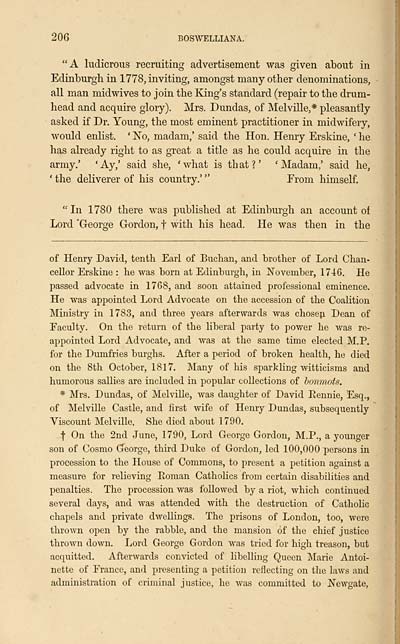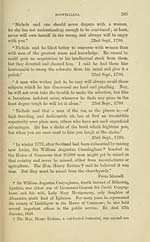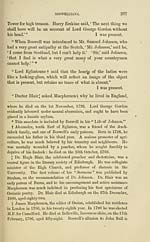Grampian Club > Boswelliana
(240) Page 206
Download files
Complete book:
Individual page:
Thumbnail gallery: Grid view | List view

206 BOSWELLIANA.
"A ludicrous recruiting advertisement was given about in
Edinburgh in 1778, inviting, amongst many other denominations,
all man midwives to join the King's standard (repair to the drum-
head and acquire glory). Mrs. Dundas, of Melville,* pleasantly
asked if Dr. Young, the most eminent practitioner in midwifery,
would enlist. ' No, madam,' said the Hon. Hemy Erskine, ' he
has already right to as great a title as he could acquire in the
army,' 'Ay,' said she, 'what is that?' 'Madam,' said he,
' the deKverer of his country.' " Erom himself.
"In 1780 there was published at Edinburgh an account of
Lord "George Gordon, t with his head. He was then in the
of Henry David, tenth Earl of Buchan, and brother of Lord Chan-
cellor Erskine : he was born at Edinburgh, in Jfovember, 1746. He
passed advocate in 1768, and soon attained professional eminence.
He was appointed Lord Advocate on the accession of the Coalition
Ministry in 1783, and three years afterwards was chosep Dean of
Faculty. On the return of the liberal party to power he was re-
appointed Lord Advocate, and was at the same time elected M.P.
for the Dumfries burghs. After a period of broken health, he died
on the 8th October, 1817. Many of his sparkling witticisms and
humorous sallies are included in popular collections of honmots.
* Mrs. Dundas, of Melville, was daughter of David Eennie, Esq.,
of Melville Castle, and first wife of Henry Dundas, subsequently
Viscount Melville. She died about 1790.
f On the 2nd June, 1790, Lord George Gordon, M.P., a yomiger
son of Cosmo George, third Duke of Gordon, led 100,000 persons in
procession to the House of Commons, to present a petition against a
measure for relieviag Roman Cathohcs from certain disabilities and
penalties. The procession was followed by a riot, which continued
several days, and was attended with the destruction of Catholic
chapels and private dwellings. The prisons of London, too, were
thrown open by the rabble, and the mansion of the chief justice
thrown down. Lord George Gordon was tried for high treason, but
acquitted. Afterwards convicted of libelling Queen ]\Iarie Antoi-
nette of France, and presenting a petition reflecting on the laws and
administration of criminal justice, he was committed to Newgate,
"A ludicrous recruiting advertisement was given about in
Edinburgh in 1778, inviting, amongst many other denominations,
all man midwives to join the King's standard (repair to the drum-
head and acquire glory). Mrs. Dundas, of Melville,* pleasantly
asked if Dr. Young, the most eminent practitioner in midwifery,
would enlist. ' No, madam,' said the Hon. Hemy Erskine, ' he
has already right to as great a title as he could acquire in the
army,' 'Ay,' said she, 'what is that?' 'Madam,' said he,
' the deKverer of his country.' " Erom himself.
"In 1780 there was published at Edinburgh an account of
Lord "George Gordon, t with his head. He was then in the
of Henry David, tenth Earl of Buchan, and brother of Lord Chan-
cellor Erskine : he was born at Edinburgh, in Jfovember, 1746. He
passed advocate in 1768, and soon attained professional eminence.
He was appointed Lord Advocate on the accession of the Coalition
Ministry in 1783, and three years afterwards was chosep Dean of
Faculty. On the return of the liberal party to power he was re-
appointed Lord Advocate, and was at the same time elected M.P.
for the Dumfries burghs. After a period of broken health, he died
on the 8th October, 1817. Many of his sparkling witticisms and
humorous sallies are included in popular collections of honmots.
* Mrs. Dundas, of Melville, was daughter of David Eennie, Esq.,
of Melville Castle, and first wife of Henry Dundas, subsequently
Viscount Melville. She died about 1790.
f On the 2nd June, 1790, Lord George Gordon, M.P., a yomiger
son of Cosmo George, third Duke of Gordon, led 100,000 persons in
procession to the House of Commons, to present a petition against a
measure for relieviag Roman Cathohcs from certain disabilities and
penalties. The procession was followed by a riot, which continued
several days, and was attended with the destruction of Catholic
chapels and private dwellings. The prisons of London, too, were
thrown open by the rabble, and the mansion of the chief justice
thrown down. Lord George Gordon was tried for high treason, but
acquitted. Afterwards convicted of libelling Queen ]\Iarie Antoi-
nette of France, and presenting a petition reflecting on the laws and
administration of criminal justice, he was committed to Newgate,
Set display mode to: Large image | Transcription
Images and transcriptions on this page, including medium image downloads, may be used under the Creative Commons Attribution 4.0 International Licence unless otherwise stated. ![]()
| Publications by Scottish clubs > Grampian Club > Boswelliana > (240) Page 206 |
|---|
| Permanent URL | https://digital.nls.uk/82554284 |
|---|
| Description | Note: Numbers 24-41 are relative to but not part of the Club's series. |
|---|---|

